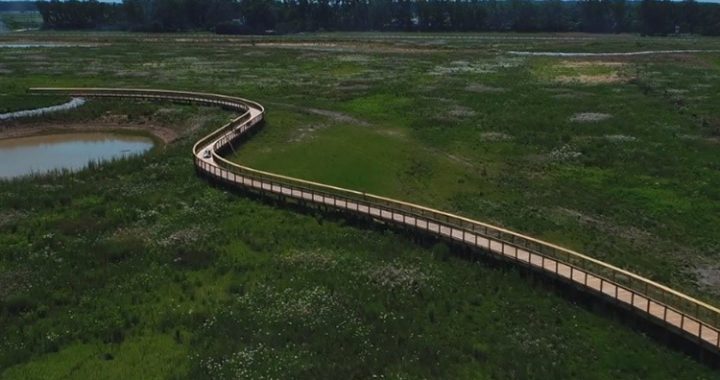July 08, 2020
Investments in Great Lakes habitat restoration will benefit local economies, strengthen healthy ecosystems and fisheries, and support resilient communities.

Restoration work underway at Howard Marsh in Lucas County, Ohio. (Photo: Metroparks Toledo)
NOAA Fisheries is recommending nearly $20 million in Great Lakes Restoration Initiative funding. It will support new and existing multi-year partnerships to implement seven projects to restore shoreline, fish passage, and wetlands. These efforts will restore habitat and improve resilience in degraded Great Lakes ecosystems.
As the largest freshwater system on earth, the Great Lakes are one of the most important natural resources in the world. They serve as important economic resources, supporting industry, transportation, commercial and recreational fishing, and tourism. This funding will help strengthen valuable fisheries and coastal resources and restore the coastal wetlands that improve the quality of our water. They will also provide recreational opportunities and enjoyment for all.
Specifically, recommended projects will open river systems to fish passage, reconnect rivers to their floodplains, and restore and enhance river, stream, and wetland habitats. Several recommended projects will contribute to ongoing activities to restore “toxic hotspots” known as Areas of Concern within the Great Lakes basin.
We’re recommending $19,696,570 in funding for two new regional partnerships and continued funding for four ongoing awards. These efforts include:
New Partnerships
-
The West Michigan Shoreline Regional Development Commission will partner with NOAA to restore fish passage and wetlands in the eastern Lake Michigan watershed. The first year of the partnership will prioritize work in Little Cedar Creek, a high-quality cold water tributary to the Muskegon River. ($187,207)
-
Ducks Unlimited will partner with NOAA to restore wetlands in priority areas throughout the Great Lakes. The first year of the partnership will support ongoing work to restore Howard Marsh, which NOAA and partners have collaborated on since 2013. ($4,022,639)
Continued Efforts
-
Friends of the Detroit River will continue to partner with NOAA on a suite of habitat restoration projects within the Detroit River Area of Concern. In partnership with NOAA and the U.S. Fish and Wildlife Service, Friends of the Detroit River will begin restoration of Sugar Island, part of the Detroit River International Wildlife Refuge. Funding will also support ongoing work at Lake Okonoka on Belle Isle. ($12,422,115)
-
The Great Lakes Commission will continue to partner with NOAA to implement several habitat restoration projects that benefit native fisheries. In the second year of the partnership, the Great Lakes Commission will continue to work on restoration projects in Lake St. Clair and the Detroit River. ($788,695)
-
The Huron Pines Resource Conservation and Development Council will continue work to remove several fish passage barriers in northern lower Michigan identified as high-priority for restoration. The projects will collectively address one of the most significant issues threatening Great Lakes fisheries: habitat fragmentation in coldwater river systems. ($734,968)
-
The Watershed Center Grand Traverse Bay will continue work on the large-scale project to restore Kids Creek in the Grand Traverse Bay watershed. This project will help restore natural stream function to the creek by replacing three undersized culverts that are restricting fish passage. ($1,540,946)
Partners in these restoration efforts—including nonprofits, local governments, and state agencies—will work with us to bring years of restoration experience and planning to reality in exciting new restoration projects. These projects will provide multiple benefits to the environment and communities by:
-
Supporting valuable fisheries and coastal resources.
-
Improving the quality of our water by restoring coastal wetlands.
-
Providing recreational opportunities for the public’s use and enjoyment.
-
Increasing the resilience of Great Lakes communities.



